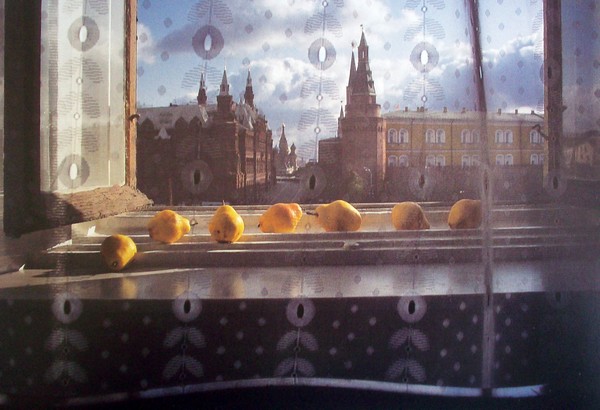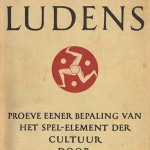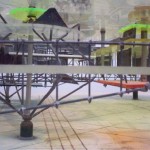In 1933, the rector of the University of Leiden, J. Huizinga, chose as the theme…
Books
Here are some books that have made an impression on me. At first view my selection must seem somewhat haphazard, but I do believe the books have a common denominator of sorts: each writer applies a new algorithm to a well-known field, making me look at the subject with different eyes.
Seeing Gardens
A photobook by Sam Abell, who sees gardens where no one else does. He poses the question of what, in its essence, a garden is. A quote: “some of the gardens that mean the most are impromptu arrangements, like this still life of pears on a windowsill in Moscow. This garden came into being casually, existed for a day or two, and vanished – in this case it was eaten. But while it lasted it was consoling.”
Rembrandt’s eyes by Simon Schama – amazing! Rembrandt left so many self-portraits, painted at every stage in his life. His is a ‘merchandised’ face – met everywhere, a recognizable presence in galleries across Europe and North America. Nonetheless, the man himself remains a puzzle. Rembrandt was a difficult man and a great risk taker in life and art: his aspirations to a bohemien Amsterdam lifestyle bankrupted him, and he died in relative poverty.
Schama gives us a lot of intelligent detail about the influences on Rembrandt, for example the 80 years war of liberation against Spain, protestants against catholics, also writes about Rubens, the italians versus the flemish painters et cetera. So interesting! Great to read about how painters were trained in those days. An example: they were made to sketch eyes for weeks and weeks, then graduating to other parts of the body until they could draw a human anatomy practically from memory. HKU, eat your heart out!
The Power of Art, also by Simon Schama.
Wanted more Schama – the man can write! – so I checked out a copy of the Power of Art from the local library (feb 2011) and went for a ride. Schama focuses on the creation and story behind a single, pivotal artwork by eight giants of western art: Caravaggio, Bernini, Rembrandt, David, Turner, van Gogh, Picasso and Rothko. He really keeps the tales of these artists going towards high drama, which makes the book a joy to read. The only big minus that I see is that the book’s reproductions are all in black-and-white, which is no good to anyone at all.
Second Nature – a gardener’s education
Written by American writer-cum-gardener Michael Pollan. I got it as a gift from a colleague about 8 years ago. This guy noticed my passion for gardening and we got talking about what rights we humans have to interfere with nature. He used to be a gardener of the laissez faire – laissez aller variety where I positively adore pruning and weeding and making order. Pollan discusses this theme very intelligently, and is a great writer into the bargain. Don’t know yet if the book is pertinent to my research. Maybe it will be, as my labyrinth plans for the outdoors lab will involve interfering with nature. Also: will like to spend some time out of doors, the art theory we get in such great measure needs airing every once and a while.
The Caves of Steel
First published as a serial in Galaxy Magazine, October to December 1953. I re-read it because it is such a contrast to ‘second nature’. In it, the whole population of Earth never sets foot on the ground at all …… It is set roughly three milennia in the future, a time when hyperspace travel has been discovered and a few worlds relatively close to the Earth have been colonised. These worlds are rich and have low population density, Earth is overpopulated and people have decided to live in ‘caves of steel’: vast city complexes covered by huge metal domes. People never go outside, are even positively shocked by the idea of sunlight, wind, direct contact with the earth. Quote, page 217 (my translation): ” Shall we have a nails worked one of the sides of the cube, and a corner of the Commissar’s office disappeared, then lighted up in a strange three-dimensional scene. The scene was displayed floor to ceiling, appeared to extend outside the walls of the office, and floated in a sort of greyish light of a kind that the City’s electricity companies never delivered. Baley thought, with a shock that was half aversion and half perverse attraction: This must be the dawn they are sometimes talking about.”
108 Tips for Time Travellers
A book I can really recommend. Peter Cochrane, head of BT’s famous Research Laboratory, takes today’s technology and projects it into the future. Like Jules Verne did, and Asimov. I like his thought experiments, also he’s very well informed about new technological developments in the fields of computer science and communication technology.
Homo Ludens
A classic on man-the-player by dutch historicist Huizinga. His ideas on how play permeates culture have been set down in 1938 but are still very much quoted today. See blog to check my notes on his book. The strange thing was that Huizinga’s book was so much easier to read in the english translation than in the original dutch version – his language is archaic….
Brilliant Orange
– A book about Dutch football between 1960 and 2000 by David Winner. Deals with the Dutch mastery of space both in real and in psychological terms, applied to the football field. A true page turner – wish philosophers would write like this. They’d probably get kicked out of their profession if they did, or have problems being taken seriously. Anyway, the book deals with with I have come to call ‘meta-perception’ ‘perception’ and ‘immersed perception’ and has a lot of interesting quotes.
Gaming – essays on algorithmic culture by Alexander Galloway. Now here is a fellow mind, an exact thinker on the subject of computers used for gaming. Exellent essays, learned a lot. He considers the video game as a cultural form, demanding a new interpretative framework. Then he develops this framework, using examples from film critique for instance. He links the philosophers I have been wrestling with to the world of philosophy, and so makes me cover new ground. A quote from page 100: “Flexibility is one of the core political principles of informatic control, described both by Deleuze in hes theorization of ‘the control society’ and by computer scientists like Crocker’.
| « Indexed to the max! | <-- previous post | next post --> | Everything I was afraid to ask » |
|---|








